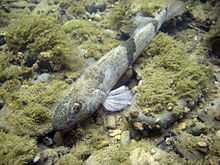Zingel asper
| Zingel asper | |
|---|---|
 | |
| Zingel asper | |
| Conservation status | |
| Scientific classification | |
| Kingdom: | Animalia |
| Phylum: | Chordata |
| Subphylum: | Vertebrata |
| Superclass: | Osteichthyes |
| Class: | Actinopterygii |
| Subclass: | Neopterygii |
| Infraclass: | Teleostei |
| Order: | Perciformes |
| Suborder: | Percoidei |
| Family: | Percidae |
| Genus: | Zingel |
| Species: | Z. asper |
| Binomial name | |
| Zingel asper Linnaeus, 1758 | |
| Synonyms | |
|
apron | |
Zingel asper, the apron, is a species of fish in the Percidae family that is at a high risk of becoming extinct due to habitat destruction and pollution. It is endemic to the River Durance and River Beaume in the Rhône River basin in France and Switzerland.
Diet and habitat
The Zingel asper's diet consist of small insects which include Diptera, Baetidae and Hydropsychidae, and varies by season. Diptera is consumed primarily during the winter.
The Zingel asper can be found in the River Durance and River Beaume. The Zingel asper lives in habitats similar to that of the loach, Cobitis calderoni, and the common minnow (Phoxinus phoxinus). It lurks on the stone bottoms of fast-flowing rivers in the day, coming out at night to feed on aquatic vertebrates. It reaches its full maturity after one year, and its length ranges from 10 to 20 cm (4 to 8 in).[2]
Breeding takes place in the deeper parts of riffles. Spawn is deposited on gravel and the eggs stick to the substrate and hatch in about fourteen days. The fertility of Zingel asper is related to its size.[3]
Status
There are four populations of Zingel asper. The subpopulations in the Durance, with 200 fish per hectare, and the Beaume, with 80 fish per hectare, are relatively stable, but the Drome population is small and the population in the River Doubs is estimated to number between 80 and 160. The IUCN rates this species as being "Critically endangered". Its total population is declining and this is thought to be due to the fragmentation of its populations and the modification and destruction of its habitat due to the construction of dams and the pollution of water.[1]
References
- ↑ 1.0 1.1 Zingel asper entry on IUCN 2010.4
- ↑ Labonne, Jacques; Gaudin, Philippe (2006). "Modelling population viability in fragmented environments: contribution to the conservation of an endangered percid (Zingel asper)". Canadian Journal of Fisheries and Aquatic Sciences 63 (3): 650. doi:10.1139/F05-245.
- ↑ Cavalli, L.; Pech, N.; Chappaz, R. (2003). "Diet and growth of the endangered Zingel asper in the Durance River". Journal of Fish Biology 63 (2): 460. doi:10.1046/j.1095-8649.2003.00168.x.
External links
- "Zingel asper". Integrated Taxonomic Information System.
- Zingel asper media at ARKive
- Zingel asper entry in Fishbase
